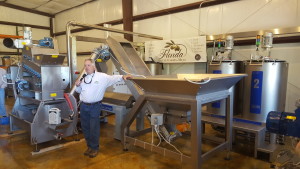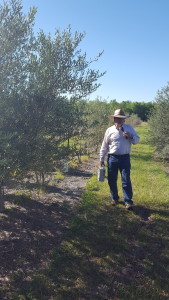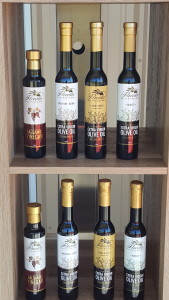Thanks to Mr. Jonathan Carter from Florida Olive Farms & Mill for welcoming a large crowd of participants to his farm in Live Oak for the Florida Olive Field Day. A large group turned out to learn about opportunities and challenges with this crop. Mr. Carter also showed the group the mill that is used to produce olive oil from his and other locally grown olives under the Florida Olive Farms & Mill brand.
The Carters planted their trees first in 2012, with an expansion in 2014. However they reported challenges from freezes in November 2014 and March 2017 have hindered their success. Coping with freeze events may be a real challenge for local groves and Mr. Carter suggested an awareness of freeze risk should be a priority for new plantings.
Olive is an evergreen tree. Olives may be established in many areas of Florida in well-drained soils. While olives grow well on almost any well-drained soil, sand-dominated soils are best as olives are susceptible to root rot diseases in moist or wet soils.
Nutrient requirements for olive are low and the trees do not produce well on highly fertile soils. Olive is a rapidly growing plant and while growth increases are possible with supplemental fertilization, too much will cause excessive vegetative growth at the expense of reproductive growth (fruiting). It is anticipated that management problems in Florida likely will involve excessive water and fertilization. However, Mr. Carter indicated challenges providing adequate Potassium fertilization in his orchards. It was suggested that deep sandy soils may require more attention to nutrient management practices, particularly potassium nutrition, for tree health and production. Olives are thought to be a relatively pest- and disease-free tree in much of the world.

Jonathan Carter gives details about the machinery and processes used to mill olive oil at Florida Olive Farms & Mill
Olive oil is known for its health benefits. Diet patterns with higher intakes of olive oil are associated with a reduced risk of death from all causes. The 2015 Dietary Guidelines for Americans suggests an oil intake of about 5 teaspoons daily for a standard diet of about 2000 calories. There are three common types of olive oil; virgin olive oil, refined olive oil, and olive pomace oil. Each has its unique processing method, flavor characteristics, composition, and food applications. Virgin olive oil is produced by crushing fresh olives, followed by mechanical extraction of the oil. No heat or chemicals are used in this process. This type of olive oil is the most flavorful and is potentially the most health-enhancing because it contains naturally occurring substances such as polyphenols.
Florida Olive Farms & Mill is the first mill in Florida and has been producing olive oil in Florida since 2014. Karen Stauderman, UF/IFAS Extension Volusia County should be applauded for developing an excellent Florida Olive Field Day with presentations on topics including grove considerations, fertility, IPM, and olive oil characteristics.


